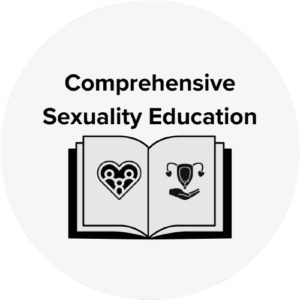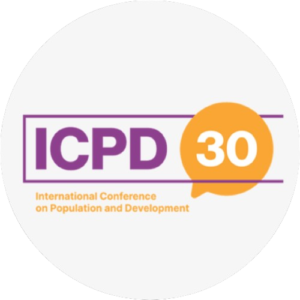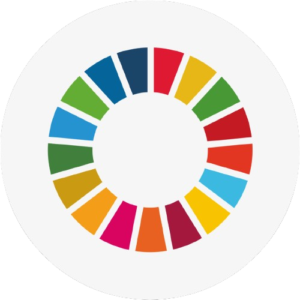Focus Area
Sexual and Reproductive Health and Rights
Comprehesive Sexuality Education
International Conference on Population and Development
Sustainable Development Goals
Gender Equality
Youth Adult Partnership
Policies related to YKP's and other Young People
Sexual and Reproductive Health and Rights

Sexual and Reproductive Health and Rights (SRHR) are an essential component of overall health and well-being, particularly for young people, and hold significant importance in the Asia-Pacific region. SRHR encompasses access to comprehensive sexuality education, contraception, safe abortion, maternal healthcare, action against gender-based violence and the prevention and treatment of sexually transmitted infections (STIs), including HIV/AIDS.
For youths, SRHR education empowers them with accurate information about their bodies, relationships, and rights, enabling them to make informed decisions about their sexual and reproductive lives. It promotes gender equality, consent, and respect, addressing harmful norms and behaviours that perpetuate discrimination and violence.
In the Asia-Pacific region, where cultural, social, and economic factors often influence attitudes towards sex and reproduction, ensuring access to SRHR services and information is crucial. Young people face unique challenges, including limited access to healthcare, stigma surrounding sexuality, early marriage, and unintended pregnancies. Therefore, by prioritising SRHR, governments and organisations can support young people in realising their rights to health, education, and equality, contributing to sustainable development and social progress in the region.
Comprehesive Sexuality Education

Comprehensive Sexuality Education (CSE) is an approach to learning about human sexuality and relationships that encompasses a wide range of topics, including anatomy, reproductive health, consent, gender identity, sexual orientation, and communication skills. It goes beyond traditional sex education by providing accurate, age-appropriate, and culturally sensitive information in a holistic manner.
For youths, CSE is crucial as it equips them with the knowledge, skills, and attitudes necessary to navigate their sexual and reproductive lives safely and responsibly. It empowers them to make informed decisions, build healthy relationships, and protect themselves from unintended pregnancies, sexually transmitted infections (STIs), and gender-based violence.
In the Asia-Pacific region, where cultural norms and societal attitudes towards sexuality vary widely, CSE plays a vital role in addressing misconceptions, stigma, and taboos surrounding sex and reproductive health. By promoting open dialogue and critical thinking, CSE helps challenge harmful norms and behaviors, including early marriage, gender inequality, and discrimination based on sexual orientation or gender identity. Ensuring access to quality CSE for youths in the Asia-Pacific region is essential for achieving broader development goals, including gender equality, health equity, and social justice.
International Conference on Population and Development

The International Conference on Population and Development (ICPD) is a landmark event in the field of sexual and reproductive health and rights (SRHR). It took place in Cairo, Egypt, in 1994, bringing together representatives from 179 countries, along with numerous NGOs and other stakeholders. The conference resulted in the adoption of the ICPD Programme of Action, a visionary document that emphasised human rights, gender equality, and the empowerment of individuals, particularly women and young people, in matters related to population and development.
ICPD recognised that sustainable development hinges on ensuring universal access to SRHR services and comprehensive sexuality education. It highlighted the importance of addressing population issues within the broader context of human rights, gender equality, and social justice. Additionally, the Programme of Action emphasized the need for partnerships between governments, civil society, and international organizations to implement its goals effectively.
For young people, the ICPD Programme of Action holds significant importance as it champions their rights to information, education, and services related to sexual and reproductive health. It acknowledges that young people have the right to make autonomous decisions about their bodies and futures, free from coercion, discrimination, and violence.
In the Asia-Pacific region, where a large proportion of the population comprises young people, the principles of the ICPD are particularly relevant. Many countries in the region face challenges related to limited access to SRHR services, traditional gender norms, and cultural barriers to sexuality education. Embracing the ICPD framework can help the Asia-Pacific region to address these challenges and advance the rights and well-being of young people, thereby contributing to sustainable development and social progress.
Sustainable Development Goals

The Sustainable Development Goals (SDGs) are a set of 17 interconnected global objectives adopted by the United Nations in 2015 to address pressing social, economic, and environmental challenges worldwide. They aim to end poverty, protect the planet, and ensure prosperity for all by 2030.
SDGs 3, 4, 5, 10, and 17 are goals that Y-PEER AP is focusing on and holds immense importance in the Asia-Pacific region:
SDG 3: Good Health and Well-being: This goal focuses on ensuring healthy lives and promoting well-being for all ages. It includes targets to reduce maternal mortality, end preventable deaths of newborns and children under five, combat communicable diseases like HIV/AIDS and malaria, and strengthen healthcare systems.
SDG 4: Quality Education: SDG 4 aims to ensure inclusive and equitable quality education and promote lifelong learning opportunities for all. It targets universal access to primary and secondary education, vocational training, and higher education.
SDG 5: Gender Equality: This goal seeks to achieve gender equality and empower all women and girls. It addresses issues such as ending discrimination, violence, and harmful practices against women and girls, ensuring equal participation and leadership opportunities, and providing access to sexual and reproductive health services and rights.
SDG 10: Reduced Inequalities: SDG 10 aims to reduce inequalities within and among countries. It targets income inequality, social inclusion, and empowerment, regardless of age, sex, disability, race, ethnicity, origin, religion, or economic or other status.
SDG 17: Partnerships for the Goals: This goal emphasizes the importance of global cooperation and partnerships to achieve the SDGs. It calls for enhanced international support, capacity-building, technology transfer, and multi-stakeholder engagement.
SDGs 3, 4, 5, 10, and 17 are vital for addressing the needs and aspirations of youths in Asia-Pacific, ensuring their health, education, equality, and participation in sustainable development efforts. Together, these goals offer a holistic framework for improving the well-being, empowerment, and future prospects of youths in the Asia-Pacific.
Gender Equality

Gender equality is the fundamental principle that all genders should have equal rights, opportunities, and treatment in every aspect of society. It involves challenging stereotypes, biases, and discrimination based on gender. Gender equality is crucial for creating a fair and just society where everyone, regardless of their gender, can thrive and contribute fully to their communities.
For youths, gender equality is particularly relevant as they are the future leaders and influencers of society. By promoting gender equality from a young age, we can instill values of respect, empathy, and fairness, leading to more inclusive and equitable communities. Empowering young people with the knowledge and tools to challenge gender norms and advocate for equality ensures a more promising future for all.
In the Asia-Pacific region, gender equality remains a significant issue due to multiple reasons. However, it’s also a region where significant progress is being made, with many countries implementing policies and initiatives to promote gender equality and empower women and girls. Recognising the importance of gender equality in Asia-Pacific is essential for addressing issues such as gender-based violence, unequal access to education and healthcare, and limited economic opportunities for women.
Ultimately, achieving gender equality requires collective efforts from individuals, communities, governments, and organisations. By working together to dismantle barriers and create a more inclusive society, we can ensure that everyone, regardless of their gender, has the opportunity to reach their full potential.
Youth Adult Partnership

Youth Adult Partnership is a collaborative approach that recognises the equal value of youth and adult perspectives, experiences, and contributions in decision-making processes, programs, and policies. It emphasises the importance of engaging young people as active partners rather than passive recipients in addressing issues that affect them and their communities.
This is essential for empowering youth and fostering their leadership skills, agency, and sense of ownership over their own development and the development of their communities. The involvement of young people in decision-making processes ensures that their voices are heard, their ideas are valued, and their needs are addressed effectively. This not only benefits young people themselves but also leads to more relevant, sustainable, and inclusive solutions to the challenges facing society.
Engaging young people as partners in development efforts is crucial for addressing issues such as education, employment, health, environmental sustainability, and social justice. Youth Adult Partnership can help bridge generational divides, promote intergenerational learning and understanding, and build stronger, more resilient communities. By promoting Youth Adult Partnership, Y-PEER AP believes that we can unlock the potential of young people as agents of positive change and create a more equitable, inclusive, and sustainable future for all.
Policies related to YKP's and other Young People
